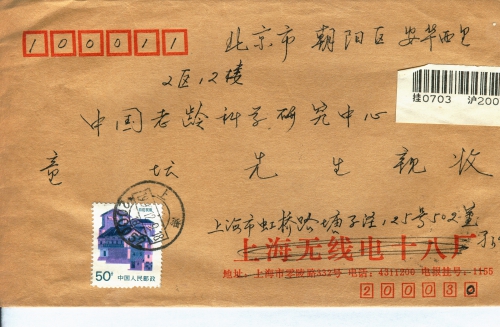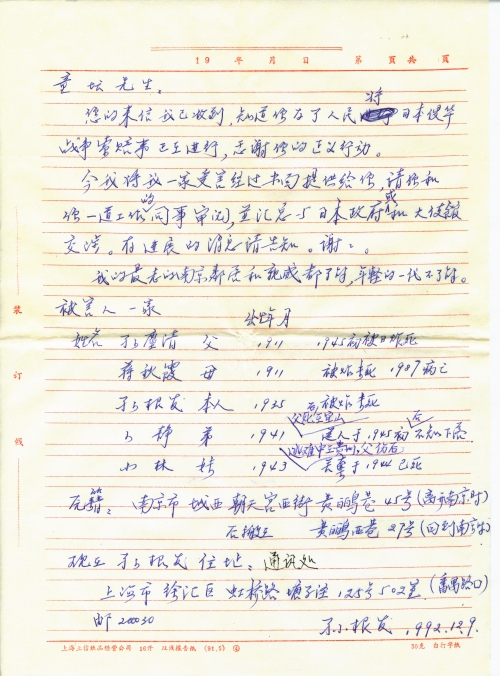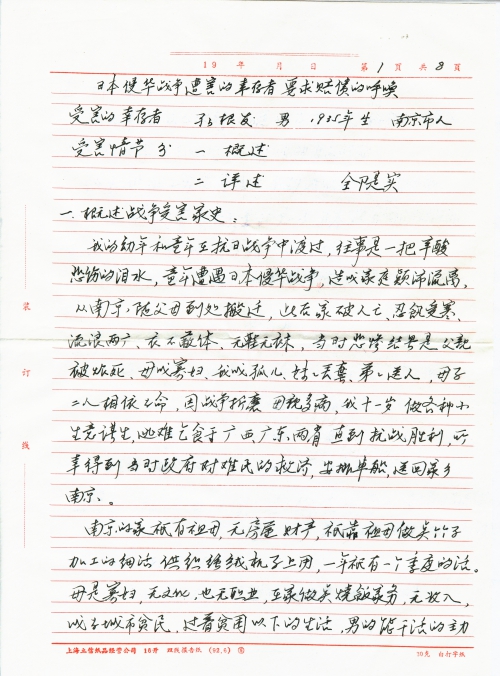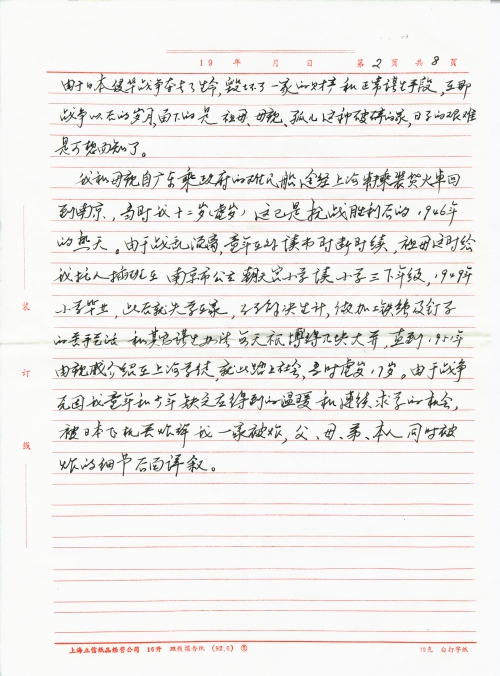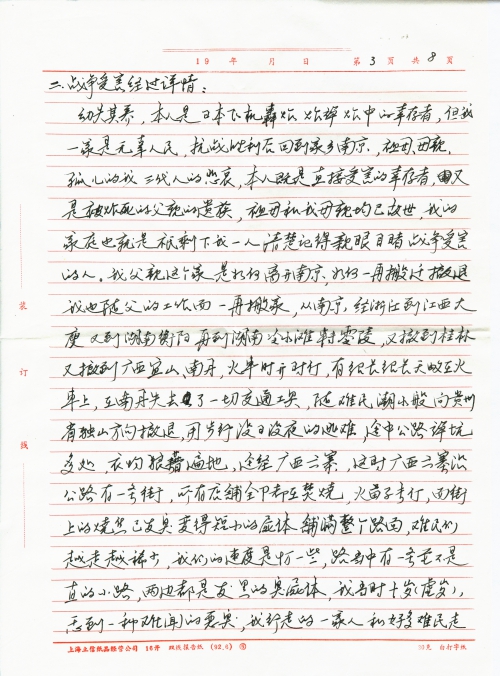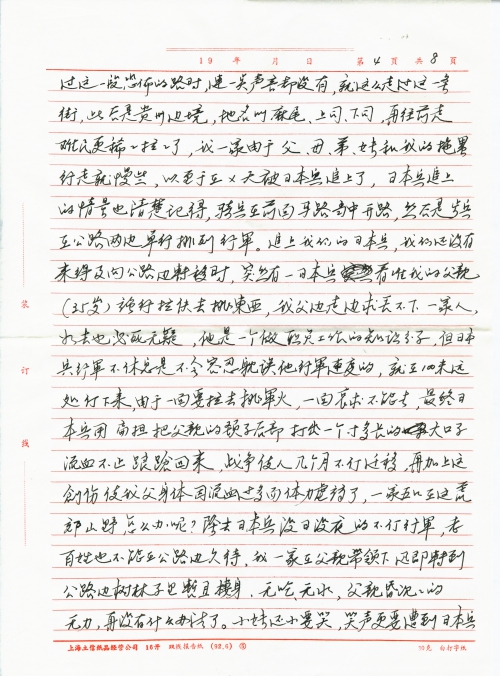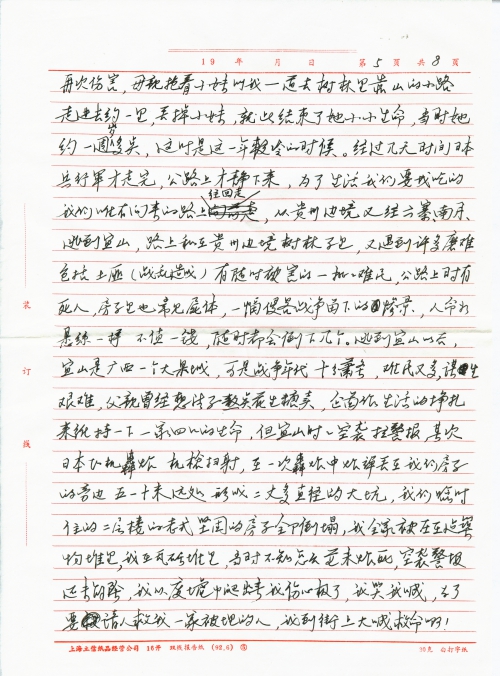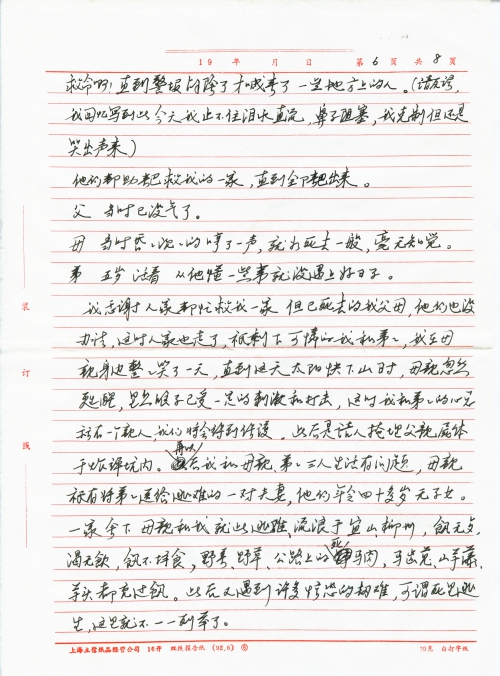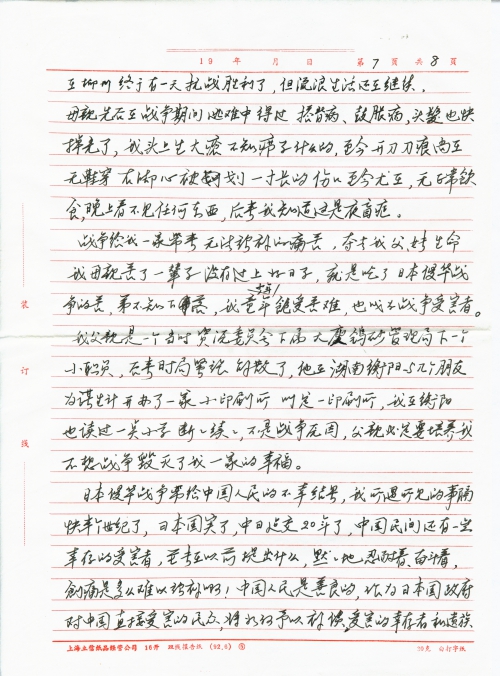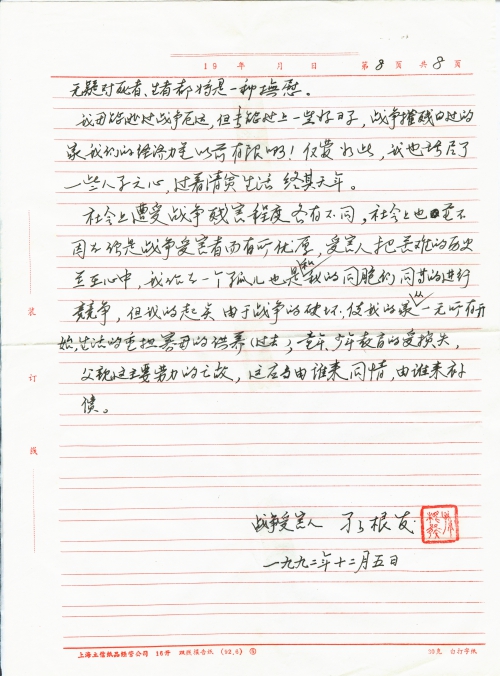Date of letter:1992-12-09
Address of author:Shanghai City
Date of event:1945
Location of event:Nanjing City
Name of author:Sun Genfa
Name(s) of victim(s):Sun Chenqing(Sun Genfa‘s father)
Type of atrocity:Air Bombings (AB)
Other details:My family moved for several times during the Japanese invasion. In 1945, we fled to Yishan County, Guangxi and again suffered from the Japanese bombing. Our houses were bombed down, everyone buried in the ruins. By the time we were rescued, my father Sun Chenqing already stopped breathing.
Mr. Tong Zeng:
I’ve received your letter and learned that you are working on the claims for victims of Japan’s war of aggression against China. Thank you for your act of justice.
I am sending you a written material about my family’s suffering for review by you and your colleagues. Please forward it to the Japanese government or negotiate with the Japanese embassy. Please inform me of any progress. Thank you.
Our suffering is well known by the oldest neighbors and relatives, but not the young generation.
Place of birth: No. 45, Huangli Avenue, Xi Street, Chaotiankong, Beijing (when we left Nanjing)
Then, we moved to No. 27, Huanglixi Avenue (when we returned to Nanjing)
Sun Genfa’s address: Room 502, No. 125, Tangzijing, Hongqiao Road, Xuhui, Shanghai (Fanyu intersection)
Postal code: 200030
Sun Genfa
December 9, 1992
Call for Compensation by Survivors of Japan’s
War of Aggression Against China
Survivor: Sun Genfa, male, born in 1935 in Nanjing
The content is divided into 1. Overview and 2. Detailed Description: The following facts are true.
1. Overview of my family’s suffering
My childhood was spent in the anti-Japanese war and was full of sorrow. My family moved from Nanjing to many other places due to the war. We suffered from hunger, coldness and the lack of clothes. The most tragic thing is that my father was killed in a bombing, my mother became a widow, I became an orphan, my younger sister was abandoned and my younger brother was given to other people. I lived with my mother on our own. My mother often suffered from illness due to the war, so I began to do all kinds of businesses to make a living when I was 11. I escaped to Guangxi and Guangdong as a refugee, begging for life. It was not until we won the war that I was returned to Nanjing thanks to the government’s rescue of refugees.
There was only my grandmother at our house in Nanjing. We didn’t own any property. My grandmother processed bamboo with hands for use by velvet weaving machines to maintain our life. My illiterate widowed mother had no job, so she cooked at home. We lived in poverty. Our father could work, but he had died in the war. The war destroyed our property and normal means of making a living. Only my grandmother, mother and I survived the war. You could image how difficult the life of a broken family like ours was.
My mother and I returned to Nanjing by taking the government’s refugee ship. I was then 12 years old (nominal age). It was the post-war summer of 1946. As my childhood study was interrupted by the war, I was arranged to study at grade 3 at Chaotiangong Primary School thanks to the help of a friend of my grandmother’s. In 1949, I graduated from the primary school and began to process wire and nails with hands to make a living. What I earned every day could only buy several pancakes. It wasn’t until 1951 when I was 17 years old that I entered the society as a relative found me a job as an apprentice in Shanghai. Due to the war, I was deprived of the warmth of family and the opportunity to study. The facts about how my family members were bombed by Japanese planes will be described in detail later.
2. Detailed description of our suffering in the war
I was a survivor of (indiscriminate) aerial bombing. All my family members were innocent civilians. After our country won the war, my grandmother, mother and I returned to our hometown Nanjing. It was a sad life for us three generations. I was a direct victim as well as an offspring of my father who was killed in a bombing. My grandmother and mother have passed away, so I am the only one of my family who remembers clearly our suffering in the war. (I remember) how we moved from Nanjing to other places with my father as his job was transferred to that place, from Nanjing to Dashou, Jiangxi through Zhejiang, and then to Hengyang, Hu’nan, to Lingling through Lengshuitan, Hu’nan, to Guilin and finally to Yishan and Nandan of Guangxi. The train sometimes moved forward and sometimes stopped; we spent many days on it. We had no vehicles at Nandan, so we retreated with other refugees to Dushan, Guizhou. We walked for days and nights. There were many bombed caves on the road. There were clothes scattered everywhere. There was a street along the road at Liuzhai, Guangxi. All the stores were burning; the ground was full of burned and stinky corpses. We slowed down a little bit. There was a small twisting path by the road with black, stinky corpses on both sides. I was then ten (nominal age). Our family and many other refugees walked through the horrible path so quietly that we couldn’t hear a sound. Then, we reached the border of Guizhou. We passed Mawei, Shangsi and Xiasi and continued walking forward. The refugees were thinly scattered. My family’s speed was so dragged down by the kids that Japanese soldiers caught up with us days later. I remember it clearly that the cavalry walked in front of the infantry. Before we could move to the roadside, a Japanese soldier captured my father (35 years old) to be a laborer. My father was an educated man and worked at an office. The Japanese soldiers wouldn’t allow him to take a rest which would slow down their speed. He stopped at a place 100 meters away from us and begged mercy of the soldier. Finally, the solider hit my father with a carrying pole, causing a 1cm-long cut at the back of his neck. My father bled badly and staggered towards us. We had moved continuously for months due to the war. The loss of blood made my father weaker. What could a five-member family do in the wild mountain? As the Japanese army marched along the road, we couldn’t stay there long. My father led us to the woods by the road to take a rest. We had no food or water and my father was very weak. My younger sister cried loud and her crying might cause Japanese soldiers to hurt us again. My mother and I walked forward along the path for about 500 meters and abandoned my younger sister there. She was a little more than 1 year old and her short life was ended in the cold winter. The Japanese soldiers kept marching along the road for days. Finally, the road became quiet. To make a living, we had to walk back the road to find food. So, we crossed the border of Guizhou and reached Yishan by passing Liuzhai and Nandan. We endured many hardships on the way and among the woods at the border of Guizhou, including bandits (caused by the war). We encountered crowds of refugees who could be victimized at any time. We could see corpses on the road and in the houses, making you realize that people’s life was worthless. Yishan was a big county in Guangxi, but it was desolate in the times of war. There were so many refugees, so it’s difficult to make a living there. My father got an idea of making and selling peanut candies to maintain the life of our four family members. But we could hear air raid alarms from time to time and Japanese planes would drop bombs and shoot at people. There was one time that a bomb was dropped to a place about 50 meters away from our temporary 2-storey solid house. The house collapsed, burying us under the structures. I was buried among the debris, but I was somehow alive. The air raid alarm was still ringing, but I climbed out of the debris. I was so sad. I cried and shouted to get people to save my family members who were still buried among the debris. I shouted “help” on the street. But it wasn’t until the air raid alarm stopped that some local people came to help us. (Please forgive me as I cannot help crying when I recall such memories.)
They helped me dig all my family members out.
My father had already stopped breathing.
My mother gave a moan and became unconscious as if she were dead.
My 5-year-old younger brother was alive. He never had a good life.
I thanked them for helping us. But they couldn’t do anything about my parents’ deaths, so they left. There were just me and my younger brother. I sat beside my mother crying all day along. At sunset, my mother suddenly came to herself. My younger brother and I were so relieved that we still had a relative who would protect us. Then, we asked people to bury my father in a bombed cave. Since it was difficult for my mother to raise me and my younger brother all by herself, she had to give my younger brother away to a fleeing couple. They were over 40 years old and had no kids. Afterwards, my mother and I escaped to Yishan and Liuzhou. Without food or water, we simply ate anything we could find, such as wild vegetables, grass, potatoes and the flesh of dead horses on the road. Afterwards, we encountered other hardships, but we survived. So I won’t give more examples here.
One day when we were in Liuzhou, we heard that we won the war, but our vagabond life continued. My mother suffered from diseases during the war and barely had any hair. I got ulcers on my head, had an operation and I still bear the scars until today. My right foot got a 1cm-long cut due to the lack of shoes and I still bear the scars. I couldn’t have regular meals, so gradually I couldn’t see anything at night, which I know is night blindness later.
The war has caused irreparable pain to my family. It took the lives of my father and younger sister. My mother never lived a good life and we did not know the whereabouts of my younger brother. I suffered greatly through childhood and adolescence and became a victim of the war.
My father was an employee with the Dashou Wolfram Administration under the then Resources Committee, which was dismissed due to the war. Then, he established a small printing house called Dingyi Printing house with several friends in Hengyang, Hu’nan. I also studied at the primary school there for a while. If not for the war, my father would bring me up well, but the war destroyed the happiness of our family.
Japan’s war of aggression against China brought misfortune to the Chinese people. It’s been nearly half a century. Japan is wealthy now and China has established a diplomatic relationship with Japan for 20 years. The surviving victims have quietly suffered the irreparable pain and never made any request. The Chinese people are kind. The Japanese government’s compensating Chinese survivors and offspring of victims will be a comfort to the dead and living.
My mother survived the war, but she never had a good life. The war destroyed our family; we had limited money. Nevertheless, I’ve done my duty as a son and enabled my mother to live a simple life until the end of her natural life span.
We all suffered from the war to different extents. Other people won’t treat you favorably because you are a war victim. The victims have to bury the miserable past in their heart.
As an orphan, I compete with other people equally, but my starting point is lower because of the difficulty for my widowed mother to support me (in the past) as we started from nothing and my lack of education at childhood and adolescence. And who shall sympathize and compensate us for the death of my mother, the main breadwinner of my family.
Victim of war: Sun Genfa (Personal seal)
December 5, 1992















